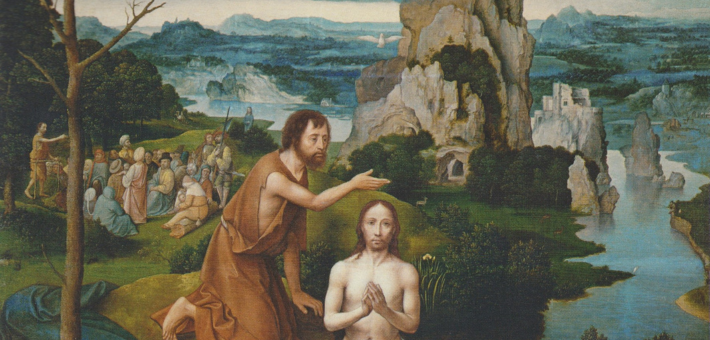Commentary on Luke 3:15-17, 21-22
“He will be called son of God” (klēthēsetai, huios theou, Luke 1:35). Later in Luke, he is also called the prophet of the Most High and next, he is called Jesus (1:76; 2:21). As the angel Gabriel promised Mary, God claims Jesus as his beloved Son at his baptism (1:35; 3:22). Jesus belongs to God; he is not a fatherless child, as the manner of his birth to Mary implies (1:30). She is an enslaved young girl of the Lord/Master (hē doulē kyriou; 1:48), which I have argued should be taken both literally and metaphorically.1
All the male children in a Jewish household, enslaved and freeborn, are circumcised at eight days old; 33 days after the birth of Jesus the parents present him to YHWH at the Temple and a purification offering is sacrificed for Mary (2:21–24; Genesis 12:1–8; 17:10–12). Observance of these rites was expected or anticipated. Anticipation or expectation of future events is a major theme in Luke’s birth narratives.
The general historical context of expectation (of relief from desperation and oppression) is identified with the words “in the days of King Herod of Judea” (Luke 1:5). King Herod the Great served the interests of and at the pleasure of the Roman Empire, just as his three sons did. Herod Antipas, known to commit evil acts against his people, ruled over Galilee, and his brother Philip was over another region (3:1, 19; 9:7–9; 13:31; 23:7–15). During the first century, many Jewish persons in Judea and Galilee had been enslaved by Rome. And some Jewish persons, including leaders, learned to profit from empire at the expense of their own people (23:1–16).
Times are desperate, and the future is bleak and uncertain. Expectation is accompanied by questions and guessing, even when an angel announces the anticipated event. The questions and guessing are a natural human reaction, given that the expectation of a future event arises in contexts of desperation and impossibility.
The first anticipated event in Luke is the birth of John (the Baptist) to Elizabeth, who is the (post-menopausal?) “barren” wife of Zechariah, a priest who serves in the Temple (1:5–13). Unfortunately, then and today women’s role in patriarchal society is viewed primarily as giving birth. And if a woman cannot give birth, naturally she is viewed as contributing little to the advancement of society. But as the African American actress Tracy Ellis Ross declared, women “do not need to push out a baby in order to help push humanity forward!”2
Call the roll of women who birthed no children but made significant contributions to society: Rosa Parks, Frida Kahlo, Virginia Woolf, Florence Nightingale, Jane Austen, Sally Ride, Lorraine Hansberry, DOI Takako, Esther Eng, Anna May Wong, Grace Harper, Ella Baker, Marion Anderson, Dr. Margaret Chung, Gerda Wegener, Emily Dickinson, Dr. Rebecca Cole, Dolly Parton, Oprah Winfrey, VP Kamala Harris, and so many other “childless” women.
The angel of the Lord (who we might presume is a male similar to Gabriel) initiates a conversation with Zechariah about Elizabeth’s body without her knowledge (1:11–20, 24–26). It’s no wonder Zechariah had questions. What does he know about a woman’s body? He is being asked to rely on another male’s words about his wife’s body. Nevertheless, Elizabeth conceives and gives birth to John, who will become John the Baptist. John will prepare a people for another anticipated male child more powerful and worthy and who will perform a different baptism (1:17; 3:15–16). John baptizes with water, but the people should anticipate that Jesus will baptize with “the Holy Spirit and fire” (3:16c).
In the conversations between the angel and Zechariah, the future birth of John is linked to messianic expectations (3:7–9; 15–17). John brings the “brimstone” in his sermonettes, referring to the crowds as “brood[s] of vipers,” unrepentant, and failures at bearing good fruit. There is no middle ground, no human complexity with John. Trees (people) who fail to bear good fruit are chopped down and burned in fire (3:9). Is this the same fire with which Jesus will baptize? Water normally extinguishes fire, but the baptism with water precedes the fire baptism. Jesus will baptize with the same Holy Spirit that was present with and overshadowed his mother Mary at conception (1:30–35).
But before Jesus has done anything, before he begins his public ministry in Luke, the voice from heaven publicly announces, “I am well pleased with you” (3:22b). The only thing Jesus has done so far is to humble himself by submitting to be baptized by a man who describes himself as unworthy to untie Jesus’ sandals and who has lived in the margins of society.
Perhaps this demonstrates God giving value to the lowliest in a society where wealth is concentrated in the top 1–2 percent. Maybe this God gives value, purpose, belonging, and a sense of dignity and worth to persons born into social statuses relegated to the bottom of a society. This divine affirmation and confirmation will allow Jesus to unapologetically speak truth to power, to stand in the midst of hostile crowds, and to stand firm before religious and political leaders.
Notes
- Mitzi Smith, “Abolitionist Messiah: A Man Named Jesus Born of a Doule,” in Bitter the Chastening Rod: African American Interpretation After Stony the Road We Trod in the Age of BLM, SayHerName, and MeToo, ed. Mitzi J. Smith, Angela Parker, and Ericka Dunbar Hill, 53–70 (Lanham, MD: Lexington Books, 2022).
- Jeroslyn JoVonn, “Tracee Ellis Ross Speaks Up for Childless Women, ‘You Do Not Need to Push Out a Baby to Help Push Humanity Forward,’” BlackEnterprise.com, September 21, 2024, https://www.blackenterprise.com/tracee-ellis-ross-childless-women/.


January 12, 2025